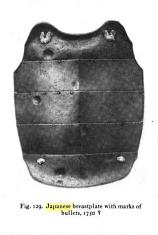Proofing (armour)

The proofing of armour is testing armour for its defensive ability, most commonly the historical testing of plate armour and mail (armour). In the early Middle Ages, armour would be classified by the blows it could withstand, being certified as proof against swords, axes, and arrows. As firearms emerged as battlefield weapons, armour would be tested against them, as well, from which came the modern term "bulletproof".[citation needed]
In Japan the testing of armor by arrow or a musket ball is called tameshi with the tested armor being called tameshi gusoku.[1] Helmet and chest armors were tested and many examples of these armors showing the bullet test marks still exist.[2][3] In the 14th century, Japanese individual scale armor pieces were said to have been tested by arrows before being assembled into an armor.[4]
References
[edit]- ^ Arms and armor of the samurai: the history of weaponry in ancient Japan, Authors Ian Bottomley, Anthony Hopson, Publisher Crescent Books, 1993, Original from the University of Virginia, Digitized Aug 26, 2008 ISBN 978-0-517-10318-0 P.140
- ^ Helmets and body armor in modern warfare, Authors Bashford Dean, Metropolitan Museum of Art (New York, N.Y.), Publisher Yale University Press, 1920, Original from Harvard University, Digitized Dec 7, 2005 P.172
- ^ Oriental Armour, Author H. Russell Robinson, Publisher Courier Dover Publications, 2002, ISBN 978-0-486-41818-6 P.227
- ^ Secrets of the Samurai: The Martial Arts of Feudal Japan, Authors Oscar Ratti, Adele Westbrook, Publisher Tuttle Publishing, 1991, ISBN 978-0-8048-1684-7 P.188
- Ffoulkes, Charles (1988) [1912]. The Armourer and his Craft (Dover reprint ed.). Dover Publications. ISBN 0-486-25851-3.
